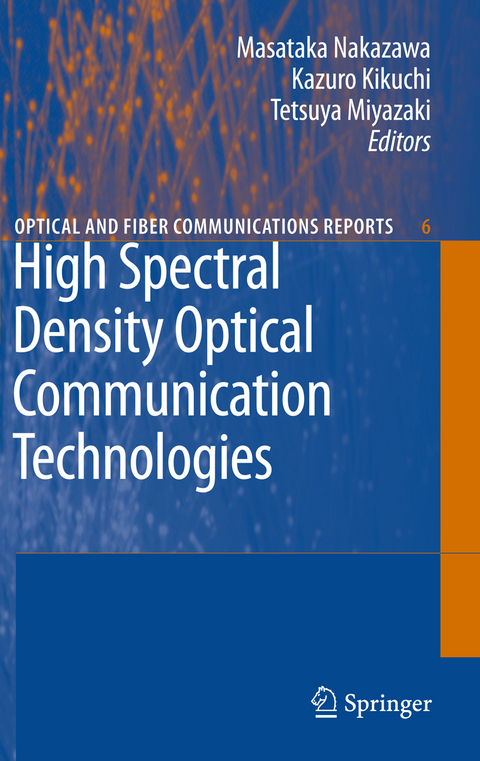
High Spectral Density Optical Communication Technologies
Springer Berlin (Verlag)
978-3-642-26441-2 (ISBN)
The growth of Internet traf?c in recent years surpassed the prediction of one decade ago. Data stream in individual countries already reached terabit/s level. To cope with the petabit class demands of traf?c in coming years the communication engineers are required to go beyond the incremental improvement of today's technology. A most promising breakthrough would be the introduction of modulation f- mats enabling higher spectral ef?ciency than that of binary on-off keying scheme, virtually the global standard of ?ber-optic communication systems. In wireless communication systems, techniques of high spectral density modulation have been well developed, but the required techniques in optical frequency domain are much more complicated because of the heavier ?uctuation levels. Therefore the past trials of coherent optical modulation/detection schemes were not successful. However, the addition of high-speed digital signal processing technology is the fundam- tal difference between now and two decades ago, when trials of optical coherent communication systems were investigated very seriously. This approach of digital coherent technology has attracted keen interest among communication specialists, as indicated by the rapid increase in the pioneering presentations at the post-deadline sessions of major international conferences. For example, 32 terabit/s transmission in a ?ber experiment based on this technology was reported in post-deadline session of Optical Fiber Communication Conference (OFC) 2009. The advancement of the digital coherent technologies will inevitably affect the network architecture in terms of the network resource management for the new generation photonic networks, rather than will simply provide with huge transmission capacity.
Overview and System Technologies.- Social Demand of New Generation Information Network: Introduction to High Spectral Density Optical Communication Technology.- Coherent Optical Communications: Historical Perspectives and Future Directions.- Ultrahigh Spectral Density Coherent Optical Transmission Technologies.- "Quasi Ultimate" Technique.- High-Speed and High-Capacity Optical Transmission Systems.- Advanced Modulation Formats.- Multilevel Signaling with Direct Detection.- High Spectral Efficiency Coherent Optical OFDM.- Polarization-Division-Multiplexed Coherent Optical OFDM Transmission Enabled by MIMO Processing.- No-Guard-Interval Coherent Optical OFDM with Frequency Domain Equalization.- QPSK-Based Transmission System: Trade-Offs Between Linear and Nonlinear Impairments.- Real-Time Digital Coherent QPSK Transmission Technologies.- Challenge for Full Control of Polarization in Optical Communication Systems.- Opto-Electronics Devices.- Semiconductor Lasers for High-Density Optical Communication Systems.- Monolithic InP Photonic Integrated Circuits for Transmitting or Receiving Information with Augmented Fidelity or Spectral Efficiency.- Integrated Mach-Zehnder Interferometer-Based Modulators for Advanced Modulation Formats.- Key Devices for High-Speed Optical Communication and Their Application to Transceiver Module.- Forward Error Correction.
| Erscheint lt. Verlag | 13.10.2012 |
|---|---|
| Reihe/Serie | Optical and Fiber Communications Reports |
| Zusatzinfo | X, 338 p. 287 illus., 13 illus. in color. |
| Verlagsort | Berlin |
| Sprache | englisch |
| Maße | 155 x 235 mm |
| Gewicht | 523 g |
| Themenwelt | Naturwissenschaften ► Physik / Astronomie ► Optik |
| Naturwissenschaften ► Physik / Astronomie ► Quantenphysik | |
| Technik ► Elektrotechnik / Energietechnik | |
| Schlagworte | Communication • Data transmission systems • digital signal processing • Fibre communication • High spectral density opt. communication • Integrated circuit • Interferometer • Laser • MIMO • Modulator • Optical communication • Optical communication technology • optical devices • polarization • SE |
| ISBN-10 | 3-642-26441-7 / 3642264417 |
| ISBN-13 | 978-3-642-26441-2 / 9783642264412 |
| Zustand | Neuware |
| Informationen gemäß Produktsicherheitsverordnung (GPSR) | |
| Haben Sie eine Frage zum Produkt? |
aus dem Bereich


